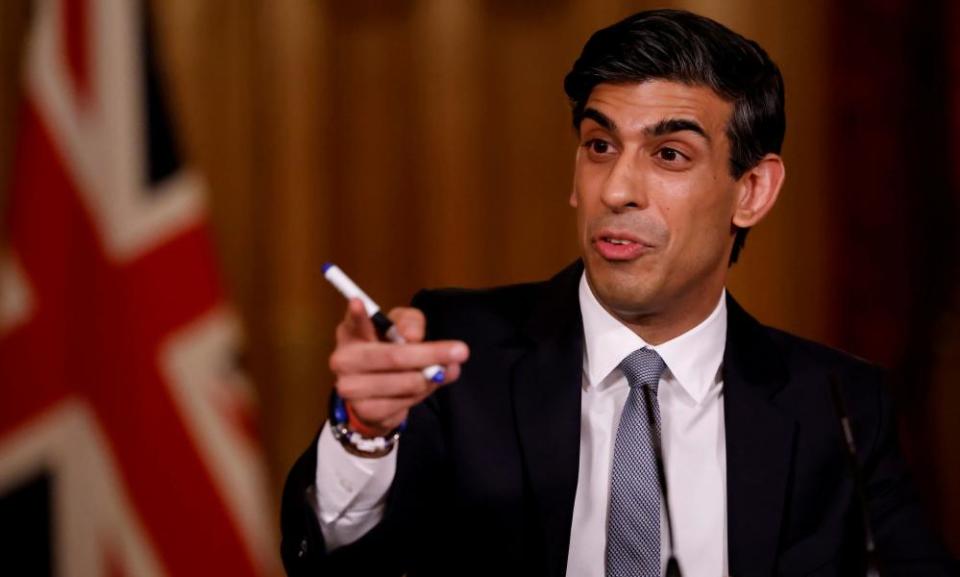Rishi Sunak has turned into a social media star, but who is he trying to influence?

“I’m sure this budget will look better on Instagram,” said Keir Starmer in the Commons on Wednesday. “In fact, this week’s PR video cost the taxpayer so much, I was half expecting to see a line in the OBR forecast for it.”
Related: Budget 2021 live: Sunak holds briefing after flagging tax rises to pay for Covid recovery
The quip was aimed at Rishi Sunak, the chancellor of the exchequer, and someone who has become increasingly hard to avoid online. The video in question was nearly six minutes long, and featured about a hundred different shots of the 40-year-old talking about the year he has had at the Treasury.
With its moments of stylish lens flare and rousing orchestral soundtrack, it was a jarring watch, mostly because it felt like promotional content for a social media influencer, not the chancellor.
It didn’t come out of nowhere; since getting promoted by Johnson, Sunak’s social media feeds have been full of slick graphics, complete with his trademark signature. Over on Instagram, there are countless snazzy and stylish slogans, as well as pictures of the man himself looking professional yet relaxed, wearing hoodies and making light jokes in the captions.
Scroll back a bit further, however, and the real Rishi begins to come out. Back in 2019, Sunak’s feed looked exactly like what you would expect from an MP. There were slightly awkward pictures in small businesses – complete with unnecessary flash – and grainy, blurry pictures of him at the Proms, looking like someone who’d won a Blue Peter competition to be there.
The man behind the glow-up was Cass Horowitz, a special adviser and co-founder of The Clerkenwell Brothers, an “independent creative studio working across strategy, identity, advertising & social”. Looking at the company’s stylised photoshoots of fancy ice-cream, luxury tequila and pouty women posing with green juice provides much needed context for the chancellor’s transformation. After all, a politician can be a product like any other; you just need to know how to market it.
“There’s a certain obvious opportunism to it,” says Philip Seargeant, author of The Art of Political Storytelling. “The particular approach he and his team are taking is probably a lot to do with the old advertising idea of positioning – finding a distinct persona within the market – so the slick but homely image that’s being pushed for him is different from the belligerent populist images that have dominated politics recently, and has the chance to stand out because of this.”
Still, the real question is: who is Brand Rishi being marketed to? This was raised by Henry Hill, the news editor of Conservative Home: “Given that the prime minister seems fairly secure in post and we’re three years away from a general election, why is he investing so much in building up his brand with the country at large? The only electorate he’s likely to face any time soon is his Richmond [Yorkshire] constituency, who would return anyone with a blue rosette.”
It isn’t even clear that the general public is the target. Take the budget video; on Twitter, which is heavily populated with Westminster insiders and political obsessives, it was watched more than 850,000 times. On Facebook, where politicians usually go to connect with more normal voters, the figure is only 33,000. Either by mistake or design, Dishy Rishi is largely being sold to the SW1 bubble, to whom a case doesn’t necessarily need to be made. This may well end up having some unintended consequences.
“The principle of collective government is supposed to be that all policies are signed off by the cabinet and the prime minister, and therefore they’re the government’s policies,” says Hill. “When he was announcing lots of very popular stuff and having his signature and his branding on it rather than the Conservative party branding, that was rubbing some people up the wrong way.”
Choosing to put himself in the spotlight this early on is risky; stars cannot keep rising forever and, especially in the fickle world of politics, it doesn’t take much to become yesterday’s man. It also seems worth mentioning that his strategy is a novel one; although many MPs have relatively high-profile social media accounts, none have pushed it quite as far as he has.
“I don’t think we’ve seen anything on this scale before,” says Bethany Wheatley, the former head of digital of the Conservative party. “Cameron had Web Cameron and strategists who understood digital, so there was a cohesiveness, but his policies were not tied to his name as the brand in the same way.”
Until Brand Rishi came along, power-hungry politicians had to raise their profile through others. There were long sit-down interviews with friendly journalists who would wax lyrical about their impeccable homes and lovely children, or soft-focus conversations on television shows not known for their hard-hitting questions.
Then, within Westminster, it was about building a fresh and trustworthy team of people around you who could talk you up to hacks and MPs alike. The game was really about surrounding yourself with people who happened to find you remarkable, instead of having to remind everyone yourself of how remarkable you were.
Cutting out the middleman may feel like a quicker option, but Sunak should keep something in mind: shortcuts tend to remain shortcuts for a reason. Everyone would take them otherwise.
Marie Le Conte is a French journalist living in London

 Yahoo Finance
Yahoo Finance 